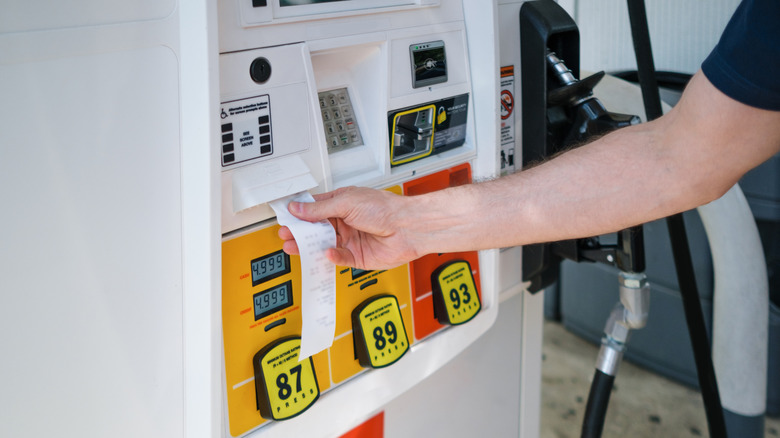There’s a long list of reasons Trump shouldn’t have joined Israel’s war with Iran, from the unnecessary death and suffering it will cause to the risk of starting World War III, his failure to get Congress’s authorization beforehand, the lack of evidence Iran was close to building a nuclear weapon, and even the fact that only 5% of Americans support war with Iran. But while an almost impossibly high 85% of respondents told YouGov they don’t want the U.S. to be involved in yet another forever war in the Middle East, Trump’s decision may soon prove even less popular if gas prices go through the roof.
Like many Middle Eastern countries, Iran is a member of the Organization of Petroleum Exporting Countries, but the risk of OPEC retaliation isn’t the only thing that could make it far more expensive to fill up your Ford F-150. Iran also controls the Strait of Hormuz, a narrow shipping channel that about 20% of the world’s oil and natural gas travel through, making it “the world’s busiest oil shipping channel.” If Iran were to close the Strait of Hormuz, it would disrupt the flow of oil out of the Middle East and raise the price of oil worldwide. That would, in turn, make gas more expensive but also likely drive up the cost of other goods, as well.
About 3,000 ships travel through the strait every month, so while China reportedly buys about 90% of Iran’s oil, closing the strait would seriously restrict the supply in the rest of the world, triggering our old friend, the law of supply and demand. There are also a few alternatives Saudi Arabia and the United Arab Emirates could use to transport oil without using the strait, but those alternatives could reportedly only handle about 15% of the oil that currently travels through the Strait of Hormuz.
Will Iran close the Hormuz Strait?
At the time of writing, the Hormuz Strait is still open, but Iran’s parliament has already voted in favor of a motion to close the strait. Whether that happens or not, however, is up to Iran’s Supreme National Security Council. That’s never been done before, even during the Iran-Iraq War, but that doesn’t mean it won’t happen this time. Iran could also reportedly close the strait relatively quickly by laying mines in the channel. The U.S. could strike Iranian Navy ships blocking the strait, but clearing out mines would likely be more difficult.
It’s hard to imagine anyone in Iran is worried about U.S. gas prices right now, but it does still have to consider the impact a closure would have on other oil-exporting nations in the region that depend on Hormuz to ship their oil across the globe, as well as China, since that’s who buys most of Iran’s oil. “Iran risks turning its oil and gas producing neighbours in the Gulf into enemies and invoking the ire of its key market China by disrupting traffic in the Strait,” Energy analyst Vandana Hari told BBC News.
Secretary of State Marco Rubio has also called closing the strait “economic suicide,” and told Fox News, “I encourage the Chinese government in Beijing to call them [Iran] about that, because they heavily depend on the Strait of Hormuz for their oil.”
While China may be forced to pressure Iran to keep the strait open and the oil flowing, it probably isn’t a great idea to depend on a country you just started a trade war with to keep your oil — and in turn, gas — prices down.
Gas Price Watch 2025
Iran also doesn’t have to completely close off the Strait of Hormuz for gas prices to go up. Even before Iran’s Parliament voted to approve closing the strait, the Guardian reports analysts expected oil prices to jump by $5 a barrel. If Iran were to close the strait, though, JP Morgan believes a barrel of oil could hit $130, up from $77 last Friday. That isn’t quite as high as the $147.50 we saw back in July 2008, but it would still be a massive jump that would raise the price of gas and drive up transportation costs for other goods at a time when many Americans are already struggling to pay their bills.
“An oil price jump is expected,” Jorge León, the head of geopolitical analysis at Rystad, an energy intelligence firm and former OPEC official, told the Guardian. “In an extreme scenario where Iran responds with direct strikes or targets regional oil infrastructure, oil prices will surge sharply. Even in the absence of immediate retaliation, markets are likely to price in a higher geopolitical risk premium.”
But hey, at least we have plenty of electric vehicles now that don’t run on gas, so skyrocketing gas prices should be no big deal this time around, right? Except Republicans hate EVs and are threatening to withhold infrastructure funds states were depending on to build more chargers. Wonderful. Are we all grateful Trump pulled out of Obama’s deal to keep Iran from developing nuclear weapons during his first term yet?




